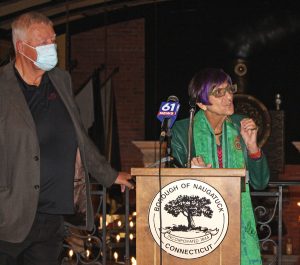By Andreas Yilma, Staff Writer

NAUGATUCK — Officials say improvements to the Waterbury branch of Metro-North Railroad are critical to spur economic development in the Valley, and federal funding can be a catalyst for those enhancements.
“What is in the bipartisan infrastructure framework, what’s in the appropriations bill are all going to be revenue and resources that Naugatuck, that Waterbury, that the Valley can access in terms of rail and transit,” said U.S. Rep. Rosa L. DeLauro, D-Conn., during a news conference on the pending federal bipartisan infrastructure bill Oct. 4 at The Station Restaurant.
The U.S. Senate has approved a $1 trillion bipartisan infrastructure bill, but a House vote is being held up by disagreements between Democratic progressive and moderates over a $3.5 trillion budget reconciliation package that is the centerpiece of President Joe Biden’s domestic agenda.
The spending and tax bill includes an assortment of longtime Democratic priorities, including education, health care, child care and climate change. To pay for the proposed spending, it would raise the corporate tax rate on businesses earning more than $5 million and the top income tax rate on incomes of $400,000 a year and up.
Officials on Oct. 4 touted the impact the infrastructure bill can have on the Waterbury branch line, a 28.5-mile passenger railroad that runs between Waterbury and Bridgeport.
“We’ve concluded that passenger trains and freight trains are the pathway to the future and we made a lot of progress,” Mayor N. Warren “Pete” Hess said. “Right now, we’re on the verge of having, for the first time, a real commuter line where we’re going to have more trains and real commuter service, and what we need is a way to enhance this project with additional improvements that are all in the cards in the new infrastructure bill.”
The bill includes $30 billion in competitive grants that will be available for the Northeast Corridor to improve rail performance, according to DeLauro’s office. There is also $100 billion in national competitive grants that Connecticut could apply for to fund infrastructure projects.
DeLauro said the framework of the bill dedicates $5.38 billion for Connecticut over the next five years, which is about $1.6 billion more than a transportation bill passed in 2015. She said officials were on track to pass both bills before an Oct. 31 deadline.
The state has invested recently in the Waterbury line. The state budget includes $1.2 million to increase the number of daily trains from 15 to 22 starting in 2023.
The state is also wrapping up a $116-million upgrade to the single-track railroad that will allow trains to pass in both directions. The project, which officials said is expected to be completed by the end of the fall, includes signalizing the branch, three passing sidings, and Positive Train Control — a system that automatically enforces safety rules, such as speed limits, if the engineer fails to act.
Hess and Waterbury Mayor Neil M. O’Leary said improvements to the rail line will spur economic development on land along the railroad.
O’Leary, who is chairman of the Naugatuck Valley Council of Governments, said there are projects underway in Derby and Waterbury along the rail line right now. He said it’s been a long journey, which started about a decade ago, to make improvements to the rail line a reality.
“This is a dream come true,” O’Leary said. “This is amazing.”
DeLauro said she’s confident the bills before Congress will pass. There is support from both sides of the aisle, she said, but the details still had to be sorted out.
“We are underway and on track,” DeLauro said.













